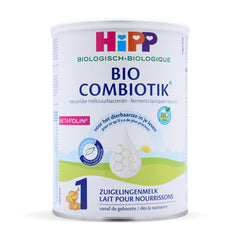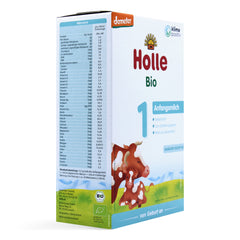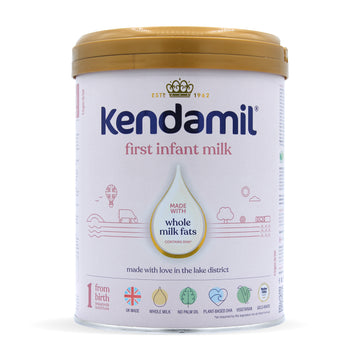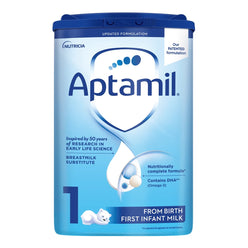Toxic Ingredients in Baby Formula
52 hours of research 5 minute read

When it comes to selecting the best baby formula for your little one, it's essential to ensure that it provides them with all the necessary nutrients without including any toxic ingredients that can harm their health. In recent years, there have been growing concerns about the presence of harmful substances in baby formula. Therefore, it's crucial to be aware of the ingredients that should be avoided when choosing the best formula for your baby.
Ingredients To Avoid In Baby Formula
Baby formula is meant to be a healthy, nutritious food for your baby. It's important to remember that the ingredients you put in your baby formula can have an impact on their health and development as well as their appearance.
There are many toxic ingredients found in some baby formulas, including artificial colors, flavors and preservatives; corn syrup (which contains high fructose corn syrup); sugar; eggs (which contain cholesterol); soy protein concentrate or whey protein concentrate—and more!
Ingredients To Avoid In Baby Formula Milk
|
GMO Ingredients |
Globally, countries are passing anti-GMO legislation, with many regulations focusing specifically on infant nutrition. GMOs have been linked to cancer, organ failure, and birth defects. |
|
Synthetic Nutrients |
Lycopene, lutein, taurine, L-methionine, and nucleotides are examples of toxic ingredients labeled as nutrients. To be clear, these ingredients can come from natural sources or be created in a lab; this is why, if you see them in your baby formulas or baby foods, you should ask where they came from. Infants who are given these cheap synthetic fillers are more likely to develop chronic diseases as they grow. |
|
Artificial Preservatives |
Preservatives are added to baby formula to keep it from spoiling and to extend its shelf life. Preservatives are not natural, and they have been shown to aggravate food allergies in infants. Preservatives such as sulfur dioxide and "additives" may be found on baby formula cans, so read the label carefully. |
|
Corn Syrup/Sugar |
Corn syrup, also known as glucose syrup, is mostly made up of corn starch. It, like sugar, is high in carbohydrates and calories but has little nutritional value. Infants who consume sugar or corn syrup on a regular basis risk developing health problems for the rest of their lives. These sugars have been linked to the emergence of a wide range of diseases and medical conditions, including heart disease, metabolic syndrome, and type 2 diabetes. |
|
Faux Iron |
Faux iron is not an important ingredient in baby formula. This electrolyte is frequently found as a fortified powder. Regular consumption can cause digestive issues at best and long-term cardiovascular problems at worst. |
|
Melamine |
Melamine is a nitrogen-rich material that is widely used in the production of plastics and adhesives. Melamine is used in dairy cows to increase milk production. This milk is then found in your infant's nutrition, along with the toxin. |
|
Mineral Oil |
The contamination of infant formula by aromatic mineral oil hydrocarbons has recently made headlines. When used in manufacturing, this highly alkaline mixture can cause diarrhea, poor nutrient absorption, and dehydration in infants. |
|
Gluten |
Gluten is a type of grain protein found in bread. It can be found in a variety of foods, including rye, wheat, barley, as well as some bread and snacks. Within the first year, babies' digestive systems are unable to tolerate the harsh gluten protein, which can cause severe constipation, abdominal pain, and long-term health problems in up to 6% of the population. |
|
Soy |
When an infant develops a milk protein allergy or sensitivity, parents avoid milk-based formula in favor of soy-based baby formula. Soy formula is not recommended unless there is a medical emergency. |
|
Toxic Heavy Metals |
Many popular baby food products contain alarmingly high levels of hazardous heavy metals such as arsenic, cadmium, and lead. These heavy metals are naturally present in all soil, but in the absence of proper regulations, these toxins pass unnoticed and can harm a baby's development. Heavy metals, in particular, have been linked to adverse effects on the developing infant's mind, brain, cardiovascular, and immune systems. |
|
Carrageenan |
Carrageenan is used as a stabilizing agent in ready-to-feed infant formulas in the United States. However, the EU prohibits its use in organic formulas because it causes intestinal inflammation. |
Toxic ingredients in baby formula can include artificial colors, flavors, and preservatives; corn syrup (which contains high fructose corn syrup); sugar; eggs (which contain cholesterol); soy protein concentrate or whey protein concentrate; GMO ingredients; synthetic nutrients like lycopene, lutein, taurine, L-methionine, and nucleotides; artificial preservatives like sulfur dioxide and "additives"; faux iron; melamine; mineral oil; gluten; toxic heavy metals like arsenic, cadmium, and lead; and carrageenan.
GMO ingredients have been linked to cancer, organ failure, and birth defects, and synthetic nutrients can cause chronic diseases in infants. Artificial preservatives may aggravate food allergies in infants, and corn syrup and sugar have been linked to the emergence of a wide range of diseases and medical conditions, including heart disease, metabolic syndrome, and type 2 diabetes. Faux iron can cause digestive issues at best and long-term cardiovascular problems at worst, and melamine can harm a baby's development. Mineral oil can cause diarrhea, poor nutrient absorption, and dehydration in infants, while gluten can cause severe constipation, abdominal pain, and long-term health problems. Soy formula is not recommended unless there is a medical emergency.
Additionally, many popular baby food products contain alarmingly high levels of hazardous heavy metals such as arsenic, cadmium, and lead. These heavy metals are naturally present in all soil, but in the absence of proper regulations, these toxins pass unnoticed and can harm a baby's development. Carrageenan is used as a stabilizing agent in ready-to-feed infant formulas in the United States. However, the EU prohibits its use in organic formulas because it causes intestinal inflammation.
To choose a safe baby formula, it's essential to consult your pediatrician before beginning or switching to a new formula. Check to see if your child is allergic to any of the ingredients in the formula, and if your child suffers from food intolerances, allergies, or sensitivities, always read the label of any formula you intend to purchase. Don't forget to keep an eye on your child in case of an allergic reaction to a new formula. Hives, sneezing, wheezing, stomach upset, and watery, itchy, or swollen eyes are all symptoms of allergies.
Heavy Metals In Baby Formula
Heavy metals in baby formula have become a concern for parents as they can have serious health implications on babies. Here are some potential risks associated with heavy metals in baby formula:
- Neurological and behavioral problems: Lead exposure can cause developmental delays, learning difficulties, and behavioral problems in infants.
- Kidney damage: Cadmium and arsenic exposure can cause kidney damage in infants.
- Cancer risk: Long-term exposure to heavy metals like arsenic and cadmium has been linked to an increased risk of cancer.
- Other health problems: Exposure to heavy metals can also cause other health problems like anemia, high blood pressure, and weakened immune system.
Here are some common heavy metals that can be found in some baby formulas:
- Arsenic: Arsenic can be found in rice-based baby formula due to the high levels of arsenic in rice.
- Lead: Lead can be found in some baby formulas that are produced in areas with high levels of lead contamination.
- Cadmium: Cadmium is a heavy metal that is found in some plant-based baby formulas.
To minimize the risk of heavy metals in baby formula, it's important to choose the right type of formula and take the following steps:
- Avoid rice-based formulas: If possible, avoid rice-based formulas as rice tends to absorb arsenic from the soil.
- Limit plant-based formulas: Plant-based formulas may contain cadmium, so limit the use of these formulas.
- Check the water source: If you are using powdered formula, make sure that the water you are using is low in heavy metals.
- Talk to your pediatrician: If you have concerns about heavy metals in your baby's formula, talk to your pediatrician.
How To Choose A Safe Baby Formula
Here's a guide to selecting the best baby formula:
- Always consult your pediatrician before beginning or switching to a new formula.
- Check to see if your child is allergic to any of the ingredients in the formula.
- If your child suffers from food intolerances, allergies, or sensitivities, always read the label of any formula you intend to purchase.
- Don't forget to keep an eye on your child in case of an allergic reaction to a new formula. Hives, sneezing, wheezing, stomach upset, and watery, itchy, or swollen eyes are all symptoms of allergies.
4 Factors To Consider When Choosing A Baby Formula

Reading the baby formula ingredient list and nutrition facts panel can provide a wealth of information. The following are some factors to consider when selecting a formula.
1. Protein Source
- Milk formulas are made with treated cow's milk to make it easier for little tummies to digest. These are usually fortified with iron to prevent iron deficiency anemia, as dairy is a poor source of iron. Lactose is the most common carbohydrate source in baby formula, but maltodextrin may also be present.
- Lactose is reduced in "gentle" milk-based formulas, and lactose is removed in lactose-free formulas. Goat's milk formula contains many of the same proteins that can cause allergic reactions as cow's milk and has only slightly less lactose.
- Hypoallergenic formulas include hydrolyzed protein formulas. These are appropriate for dairy and soy-free babies who require predigested proteins that are easier to tolerate.
2. Fat Source
- Oils that mimic the fatty acids found in breast milk are commonly used in baby formulas. To ensure that their products meet the fat requirements specified in current EU regulations, most infant milk manufacturers use a blend of vegetable oils.
3. Secondary Ingredients
- Some formulas contain starch, which is intended to help babies who have reflux keep formula down. Other formulas are designed specifically for premature and low birth weight babies, with extra calories and nutrients to aid in catch-up growth.
- Some formulas contain additional ingredients like the omega-3 fats docosahexaenoic acid (DHA) and arachidonic acid (ARA), which are found in breast milk and fatty foods. DHA and ARA help with normal brain and vision development in babies.
- Prebiotics and probiotics are also found in some baby formulas. Since these compounds have the potential to support digestion, immunity, and overall gut health, including them in baby formulas is beneficial.
4. Expiration Date
- While most foods do not expire on the exact date listed on the packaging, it is better to be safe when it comes to baby formula expiration dates. While eating potentially expired foods is less dangerous for adults, babies are still developing immunity. They may not be as prepared to deal with potential contaminants in expired formulas. Always double-check the expiration dates on your formula.
What Makes A Baby Formula Healthy?
A quality baby formula label should be easy to read and understand, with no strange chemical names or strange-sounding ingredients.
A long list of complicated ingredients should be one of the first red flags to look for when selecting a baby formula. Here are the other things to consider:
- Since organic farming methods are stringent and regulated by European Union law, organic European baby formulas will have no pesticide residues.
- When selecting a baby formula, it is critical to consult with the child's pediatrician first. Discuss any concerns you have about baby food additives and other potentially dangerous ingredients.
- The pediatrician will be well-versed in infant nutrition. Some parents choose an EU organic baby formula free of additives and then request approval from the baby's doctor. This will provide the nutrition the baby requires while avoiding potentially harmful additives.
Is European Organic Baby Formula The Best Formula?
European baby formulas are generally considered healthy because they are subject to strict regulations and safety standards set by the European Union (EU). Here are some of the factors that contribute to the overall quality and safety of European baby formulas:
- Nutrient content: European baby formulas are required to contain a specific amount of nutrients, including vitamins, minerals, and fatty acids, to support the growth and development of infants.
- Quality ingredients: European regulations prohibit the use of certain ingredients, such as genetically modified organisms (GMOs) and artificial flavors and colors. European formulas also often contain high-quality, organic ingredients.
- Safety standards: The EU has set strict safety standards for the production, processing, and packaging of baby formulas to ensure that they are free from harmful contaminants.
- Manufacturing processes: European formulas are subject to rigorous quality control measures, and manufacturers must follow strict protocols to ensure the safety and consistency of their products.
Overall, European baby formulas are considered healthy because they provide essential nutrients and are subject to strict safety and quality standards. However, it's important to note that individual babies may have different needs or sensitivities, so it's always a good idea to consult with a healthcare professional before choosing a specific formula for your child.
Organic Life Start offers several formulas that meet European standards and contain only approved baby formula ingredients.
HiPP has been the perfect substitute for breast milk with sustainable values and ecological agriculture for over 100 years. According to a survey, about 97% of mums were happier with HiPP and gave positive feedback.
Check PriceHolle is an organic infant formula brand launched in 1933 and has been serving many parents for over 85 years. The company offers a wide range of Demeter Certified (organic++) formulas that are free of synthetic additives, preservatives, and pesticides.
Check PriceLebenswert Baby formulas were created by the famous, organic, Europe’s largest baby formula producer Holle back in 2009. The formula was primarily launched in Austria while utilizing high-quality, Bioland-certified (Germany’s largest organic food association) organic ingredients.
Check PriceKabrita has 75 years of experience in producing goat milk-based baby formula. Kabrita is a division of a multinational company, Ausnutria. Ausnutria factory dates back to 1897. It now produces goat milk-based baby formulas, baby food such as cereals and snacks, private label baby formula, and a large range of dairy products and ingredients.
Check PriceKendamil is the only British-based organic milk formulated using whole milk from cows fed on local, Red Tractor Accredited organic farms in Lancashire and Cumbria. Kendamil ensures complete traceability of ingredients with the world’s highest food safety standards compared to foreign imported brands.
Check PriceNannycare is a family-owned and run business in New Zealand. It is the pioneer company that pushed goat baby formula to the mainstream market. It has greatly contributed to the product’s legislation in the EU and UK.
Check PriceAptamil, a trusted and reputable baby formula brand that started in Germany, offers a range of scientifically formulated infant formulas designed to provide essential nutrition for healthy growth and development during the crucial early stages of a baby's life.
Check PriceWhy Choose Organic Formula Without Toxins
Organic Life Start believes that organic formula is the best thing you can give your child for healthy growth. Here are some of the benefits of using an organic formula.
1. Organic Formula Is Free Of Growth Hormones And Agricultural Chemicals
Do you know why thousands of parents choose organic baby formula for their little ones? It’s because organic formulas have no growth hormones.
Infants and children cannot tolerate toxic substances and drugs because their digestive systems have not matured yet. Non-organic formulas contain artificial growth hormones, as well as pesticide residues. With organic formulas, you will rest assured that they do not contain any synthetic growth hormones.
2. Organic Formula Is Highly Nutritional
The main goal of formula feeding is to help your baby grow up healthy and strong by providing essential nutrients. Organic formulas contain the right blend of vitamins & minerals.
3. There Are No GMOs (Genetically Modified Organisms)
Do you know that a high percentage of non-organic formulas contain GMOs? Research has shown that GMOs can toxically affect a baby’s organs and systems. Fortunately, organic baby formula not only contains synthetic ingredients, but also you’ll find organic formulas to be GMO-free.
It’s good to know that organic formula is more natural and healthier and tastes more like breast milk. This allows your baby to get every nutrient essential for their growing body and mind.
4. You Won’t Be Giving Your Baby Any Unnatural Sugars Or Emulsifiers
Non-organic baby formulas use the following harmful emulsifiers
- Taurine
- L-carnitine
- Lycopene
- Nucleotides
- Hexane
As with emulsifiers, studies have found that infant gut biome and metabolic health can be disrupted with commonly permitted emulsifiers. The common emulsifier used in non-organic baby formulas is carrageenan.
Corn syrup and fructose are commonly found in non-organic infant formulas. Would you be satisfied by giving your little one the formula with lots of sugars?
With organic formulas, you will never see any sugars in disguise, emulsifiers, and harmful preservatives. In Europe, an organic formula must contain 30% of the carbohydrates from lactose (a naturally occurring sugar). This is the main reason why European organic formulas are preferred.
5. Organic Formula Is Gentle And Complete
Organic baby formula is manufactured with ingredients that resemble breast milk. It means a more natural formula without any artificial ingredients like processed sweeteners. Organic formula is easy and gentle on your baby’s digestive system, is highly digestible, and provides complete nutrition to your little one.
6. Organic Formula Supports Better Farming Practices
Besides taking care of your child’s overall health, the organic baby formula supports better farming practices, giving your child and the environment a more sustainable future.
Non-organic dairy farms are considered ecological disasters for polluting the environment, due to which cows lose their milking practices and suffer abusive conditions. Unlike large-scale non-organic dairy farms, organic baby formulas source their milk from smaller dairy farms with more ethical operations, meaning that organic dairy farms take care of animal welfare and their environment.
7. Organic Formula Is The Healthiest
With the organic formulas, the likelihood of infants developing any health complications is lower.
Toxic Ingredients To Avoid In Baby Formula
Parents can take several steps to avoid toxic chemicals in baby formula. First, they can choose organic and non-GMO products. These products are often grown and processed without the use of pesticides and synthetic chemicals, which can reduce the risk of exposure to harmful toxins. Second, they can look for brands that use high-quality ingredients and avoid additives like synthetic preservatives, colors, and flavors. Third, they can consult with their pediatrician and do their research to ensure that the formula they choose is free from known toxins like BPA, phthalates, and heavy metals. Lastly, they can follow proper preparation and storage guidelines to reduce the risk of contamination.
Baby Formulas With Health Conscious Ingredients
Organic Life Start is committed to providing accurate, reliable, and trustworthy information to parents and caregivers. We carefully choose credible sources and follow a meticulous fact-checking process to uphold the highest standards in infant nutrition and parenting advice. To learn more about our dedication to accuracy, please explore our editorial guidelines.
Link To Sources
- https://www.happiestbaby.com/blogs/baby/choose-best-baby-formula
- https://www.healthychildren.org/English/ages-stages/baby/formula-feeding/Pages/Choosing-an-Infant-Formula.aspx
- https://elsenutrition.com/blogs/news/baby-formula-a-definitive-guide-to-what-to-look-for-and-what-to-avoid
- https://www.firststepsnutrition.org/fat-content-of-infant-milks


















Jayson K -
Same here! I had no idea what was actually in a lot of the U.S. formulas until I looked into it more. We switched to Holle and the transition went super smoothly. My baby took to it right away, and I noticed her poops got more regular and she seemed less gassy. Definitely worth trying if you’re thinking about making the switch.
Gracelyn -
I’ve always used a big-name U.S. formula, but now I’m curious about trying a cleaner European option like HiPP or Holle. I had no idea how many unnecessary ingredients some formulas include. Has anyone made the switch? Was it a smooth transition for your baby? I’d really appreciate hearing how it went for other parents.
Jude W -
When I was struggling with finding the right formula for my baby who had constant tummy issues and unexplained rashes, I wish I had known about the toxic ingredients hiding in so many mainstream brands. At the time, I trusted that all baby formulas were safe, not realizing how much sugar, corn syrup, and even heavy metals could be present. It wasn’t until I switched to an organic European formula that I saw a huge difference—her digestion improved, and she was so much more content. I now always read the label and check for synthetic additives, thanks to the awareness articles like this one provide. If I could go back, I’d make the cleaner, organic choice from the start.